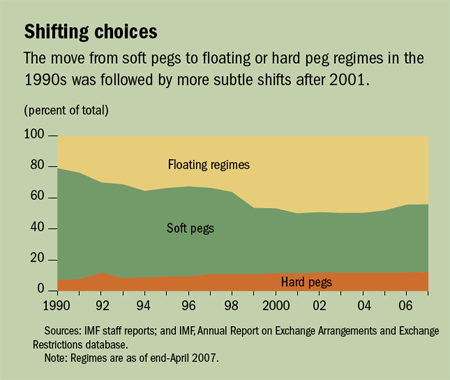Fixed Versus Floating Exchange Rate_2
Post on: 14 Апрель, 2015 No Comment

1 Fixed Versus Floating Exchange Rate on Wed Dec 30, 2009 1:21 pm
People are always asking what’s the difference in these:
Fixed Versus Floating Exchange Rate
An exchange rate is the price at which trades the currency of one country to another in the forex market, there are 2 exchange rate regimes – the floating exchange rate and the exchange rate fixed.
Floating exchange rate
The floating exchange rate is market-driven prices of currencies in which the exchange rate is entirely determined by free market forces of supply and demand of foreign exchange without government intervention whatsoever.
In general, the floating exchange rate system is composed of independent floating and managed floating. The first is when the exchange rate is strictly determined by the free movement of demand and supply. To manage a system floating exchange rate is also determined by the free movement of demand and supply, but the monetary authorities intervene at certain times to manage the exchange rate to avoid high volatility.
Pros and cons of floating exchange rate
The floating exchange rate has several merits. First, the correction is automatic in the floating exchange rate as a country can only move freely in the equilibrium of demand and supply. Second, is the isolation external economic developments, as the country’s currency is not linked to the high inflation rate is possibly the world, under a fixed exchange rate. The free movement of demand and supply helps to insulate the economy from the economic fluctuations national. Third, governments are free to choose their domestic politics as a floating exchange rate that enable Automatic imbalance correction in the balance of payments that may arise from the implementation of the policy national.
However, also refers in particular on the exchange rate is unstable and uncertain in the floating exchange rate. Also, speculation tends to be higher in the floating exchange rate, which creates uncertainty, especially for traders and investors.
Fixed exchange rate
For an exchange rate fixed, the government is not willing to let the currency float freely in the country, and indicate a level where the exchange rate will stay. The government takes all necessary measures to keep pace and avoid the fluctuations. There are two methods that the exchange rate could be applied to the currency rate, a fixed exchange rate and a fixed exchange rate.
As part of the fixed exchange rate, lower exchange rate is rarely called revaluations. Even if growth rates are expected devaluation. Devaluation fixed exchange rate because the current account to rise, makes a country’s exports less expensive for foreigners and discourage imports by making imported goods more expensive for domestic consumers. This will lead to a growing surplus of Name or decrease the trade deficit. The opposite occurs when the revaluation
Pros and cons of fixed exchange rate
Despite its rigidity, the fixed exchange rate regime is still used for several reasons. First, there is certainty in the exchange rate fixed. With its international investment trade becomes less risky. Speculation Secondly, there is little or no information on a fixed exchange rate.
However, a rate fixed exchange rate contradicts the objective of free markets and not able to adapt quickly to crises such as the floating exchange rate.
About the Author:
360strategyleadership.blogspot.com/














